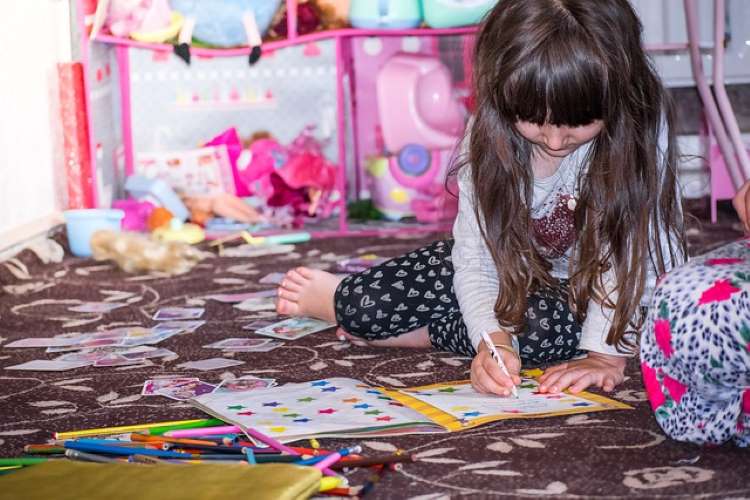It’s easy to take advantage of everyday chances to think about colours when you’re surrounded by them. Of course, given the importance of teaching colour perception to infants, parents and educators can use a variety of methods to assist children in learning about colour, the most successful of which is teaching them by colouring videos for toddlers.
Let’s see how you can introduce fun colouring for toddlers through videos and make their lives colourful.
Also Read: An Extensive Guide to Understand Educational Toys for Kids
Reasons Your Toddler Might Struggle with or Dislike Colouring?
It’s one of the developmental milestones that children meet between the ages of three and five, but psychologists warn against specifically instructing children to colour within the lines because it may make the task sound tedious.
A growing number of children are having trouble with basic colouring skills. But, before we get into how to teach your child to colour, let’s take a look at some of the reasons why he or she might hate it.
- Difficulty
Colouring is generally disliked by children because it is unpleasant for them. If one of the skills listed above has not been improved or created, colouring may be challenging for the infant. Their paws, for example, get exhausted easily if they lack fine motor control. If they don’t have artistic abilities, they may not be able to match what they see in what they paint or draw.

- Perfectionism
Since they believe they aren’t very good at colouring, some toddlers hate it. When a boy compares his colouring to that of his mother or a classmate, he becomes disappointed and quits.
- Attention or Boredom
Let’s face it: we live in a world where technology and instant gratification reign supreme. Why would a kid want to waste all the time, effort, and trouble colouring a page when they can paint shapes on their tablet with a single touch of a finger?
Also Read: Easy Painting Ideas for Your Little Artist: How Does Painting Help Kids in Their Development?
How to Teach Colouring to Toddlers through Videos?
As adults, we like to think about colouring as an easy, elementary sport. In reality, a child’s ability to comprehend a writing utensil and begin to colour with any precision requires a wide range of abilities.
Colouring is a traditional childhood pastime as well as a requirement for school skills such as handwriting. But what if your kid isn’t interested in colouring, or even worse if he or she dislikes colouring? What methods do you use to show your kid how to colour? Let’s take a look at how!
Place the Child in the Appropriate Position for Colouring Activities
Ascertain that the child is colouring in a relaxing setting. Seated in a chair with their feet on the floor (feet flat on the floor gives stability), or lying down on the floor with their belly on the floor and forearms and elbows supporting.
Provide your child with a suitable location and access to the internet, and assist him in searching for some fantastic colouring videos.
Strengthen Your Hands and Develop Your Fine Motor Skills
Play-doh or resistive Theraputty is an outstanding hand and finger strengthener. Using tongs or tweezers to reinforce tiny hands and fingertips, or pinch clothespins and other clips.
With the aid of colouring images, your child will practice the proper grip for paintbrushes and crayons.

Improve Your Sensory Vision and Motor Skills
Basic visual processing skills can be practiced with simple insert puzzles or shape sorters. Visual-motor capabilities should be improved by stacking rings, pegboards, tracing drills, or throwing and catching a ball.
Children prefer to retain more information when using visual images and images than when using other methods.
Provide a Wide Range of Media and Colouring Materials
Some children find it difficult to paint with crayons, so if they have access to other colouring supplies, they will be more likely to join. When making them, don’t be afraid to let your imagination run wild. To colour in, use shaving cream or foam cleaner, bathtub crayons, paint or finger paint to paint, and sidewalk chalk to draw in.
Experiment with Hand-Over-Hand
It’s often better, to begin with, a hand-over-hand approach while teaching toddlers a new talent, such as colouring. Simply put, you place your hands on theirs and guide them through the motions.
Teach them How to Hold Things and How to Travel
Don’t worry about a toddler’s or preschooler’s understanding while they’re trying to draw. When they get better at keeping and manipulating the colour, you can start showing them more sophisticated grip patterns (tripod grasp).
Increase the Size of the Borders and Outlines on the Files
When children are learning to colour, provide them colour sheets with large shapes and borders. Children can find it difficult to remain inside small shapes and lines until they have more accurate colouring skills.
Let the Outlines of the Shapes Stand Out
Another great tip for teaching children to draw along the lines is to find a way to illustrate the boundaries. Make the shapes deeper by tracing them with a pen, or make more 3-dimensional boundaries by tracing them with glue.
It is Said that Practise Makes Better
Like any other skill, these skills can only be developed by practice and repetition. Your kid will be colouring in no time with a little patience and practice! Expose them to a variety of awesome colouring videos for toddlers to help them grow their imagination and curiosity.
Also Read: Painting can Increase Your Kids Patience and Focus: Five Best Painting Ideas for Kid
Conclusion
Children must first acquire informational bits before they can begin to grasp colour as a concept. Children lack the academic ability to understand that light blue and navy are also blue, as well as the verbal skills to explain it to you.
Children must consider what colour means in addition to recognizing what it is called; it is not the height, form, name of the material, texture, or number of objects visible.
Since colour is so common in everyday life, there are many opportunities to educate children about colour when they are out and about. One way to educate children about colour is to choose a different colour each week and concentrate solely on that colour in the food selections, sports, and so on.
Hopefully, you found this information helpful, and please let us know if you have any additional questions in the comments section below. Also, look into our other blogs.







